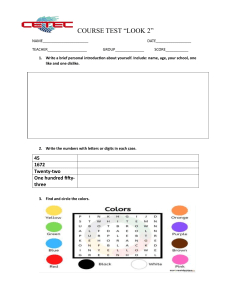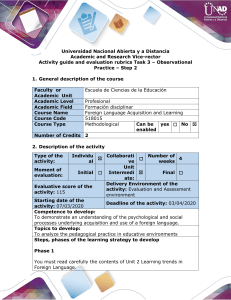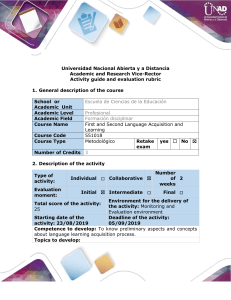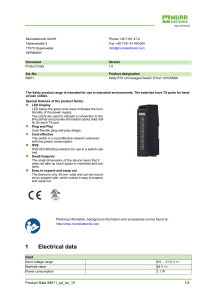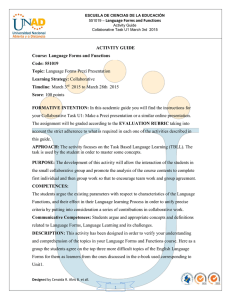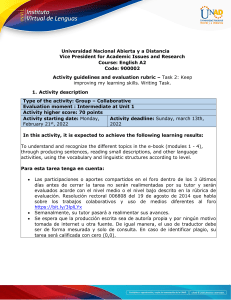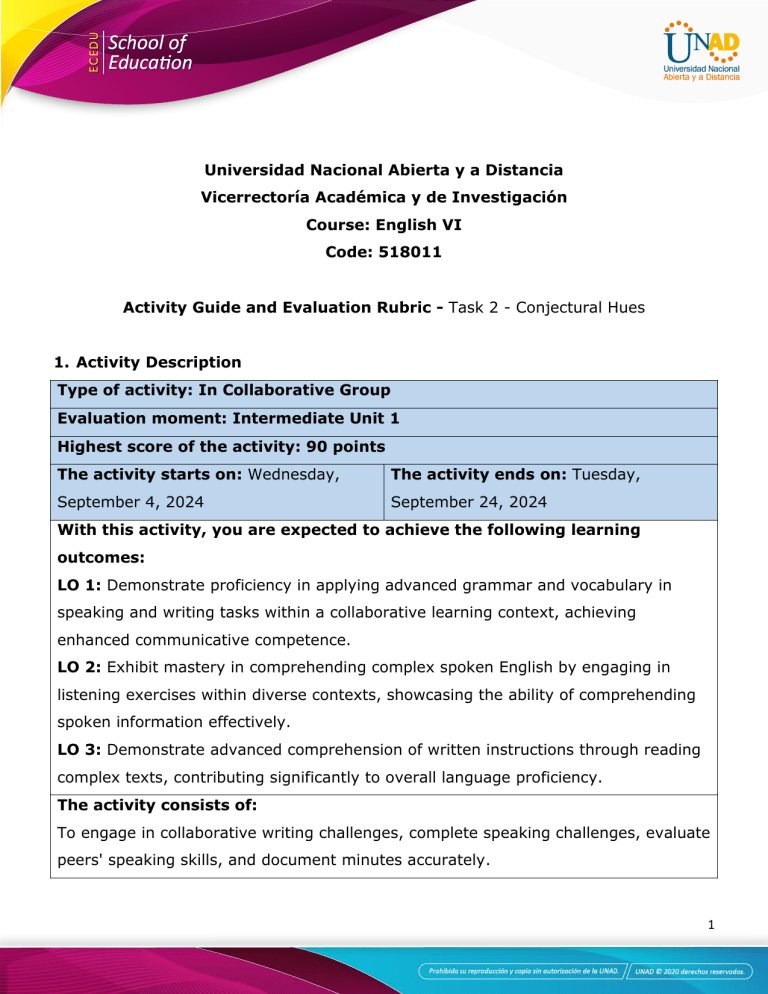
Universidad Nacional Abierta y a Distancia Vicerrectoría Académica y de Investigación Course: English VI Code: 518011 Activity Guide and Evaluation Rubric - Task 2 - Conjectural Hues 1. Activity Description Type of activity: In Collaborative Group Evaluation moment: Intermediate Unit 1 Highest score of the activity: 90 points The activity starts on: Wednesday, The activity ends on: Tuesday, September 4, 2024 September 24, 2024 With this activity, you are expected to achieve the following learning outcomes: LO 1: Demonstrate proficiency in applying advanced grammar and vocabulary in speaking and writing tasks within a collaborative learning context, achieving enhanced communicative competence. LO 2: Exhibit mastery in comprehending complex spoken English by engaging in listening exercises within diverse contexts, showcasing the ability of comprehending spoken information effectively. LO 3: Demonstrate advanced comprehension of written instructions through reading complex texts, contributing significantly to overall language proficiency. The activity consists of: To engage in collaborative writing challenges, complete speaking challenges, evaluate peers' speaking skills, and document minutes accurately. 1 Step 1: APA Template Mastery • Use the APA Template downloaded in Task 1 from the News Forum to ensure your final document meets formatting requirements. Step 2: Web Conference Launch (Group) • Attend the First Web Conference of the course. As a group, write and submit the Minutes of the web conference meeting. Step 3: Learning Journey Kickoff (Independent) • Each group member should review the contents of Unit 1 to understand key grammar concepts. Step 4: Writing Challenge (Group) • In the discussion forum for this task, you will find a chart listing 3 writing challenges. To enhance your collaborative writing skills, you will complete one writing challenge per week with your group. Each challenge involves collaborative writing, where each group member will contribute one complexcompound sentence. Step 5: Speaking Challenge (Group) • In the discussion forum for this task, you will find a chart listing all the speaking challenges. Complete each challenge and post the video call recordings directly in the forum. You can post them daily or every five days. Each video should be between 1 and 3 minutes long. Avoid lengthy salutations or farewells, and there's no need to introduce yourselves again, as you did this in Task 1. Make the conversation sound as natural as possible, as it is a video call. Aim to complete one challenge per day over the course of 15 days. • The tutor will randomly select one video per student each week to evaluate based on vocabulary, grammar, fluency, communication, and pronunciation, using proficiency levels as the criteria. This structured approach will help you progressively improve your speaking skills. 2 Step 6: Evaluating My Mates' Speaking Skills (Group) • Evaluate one video from each of your peers. Assign a score from 0 to 5 for each aspect, where 0 represents poor performance and 5 indicates excellent performance. In a group of 5, evaluate 4 classmates. The evaluation chart is available in the forum—please fill in the relevant details for each aspect. Happy evaluating! Step 7: Submission Success • Submit the final PDF document to the Evaluation Environment for assessment. For the development of the activity consider that: In the Initial Information Environment, you must: - Check the Course Agenda to organize your time. - Check the Course News and the Internal mail as often as possible. - Verify the date for the First Web Conference so that you can plan your participation accordingly. In the Learning Environment, you must: - Check the Course Contents and Bibliographic References for Unit 1. - Download the Activity Guide and Evaluation Rubric for Task 2. - Go to the discussion forum for the task and actively participate as requested in the activity. In the Evaluation Environment, you must: - Upload a PDF file with the task’s group evidence. Identify your file as follows: Task 2 – Group [Your Group Number].pdf Evidence of independent work: No independent evidence is required in this activity. Evidence of group work: The group work evidence to be submitted is: A PDF file named Task 2 – Group [Your Group Number].pdf with the following pages: 3 • Cover Page • Table of Contents • Minutes (Formal notes from the web conference meeting, following a specific format) • Writing Challenge (Include the creative writing pieces, clearly labeled and organized by challenge) • Speaking Challenge (Include a chart with recording links for each participant, indicating which challenge each link corresponds to and which participant it represents) • Evaluating My Mates' Speaking Skills (Include the charts with each participant's evaluation) • References 2. General Guidelines for the Development of Evidence to Submit For Group Work evidence, consider the following: ▪ Active participation is crucial for effective group collaboration. It involves engaging in discussions, sharing ideas, and offering constructive feedback. By actively participating, you contribute to the group's progress and help generate new ideas. It's important to listen attentively to others and be open to different perspectives, as this fosters a collaborative environment where everyone feels valued and heard. ▪ Effective communication is essential for successful group work. Clear and concise communication helps ensure that everyone understands the goals, tasks, and expectations. It's important to use respectful language and tone when communicating with group members. Active listening is also a key component of effective communication, as it helps prevent misunderstandings and promotes a positive group dynamic. 4 ▪ Collaborative decision making involves working together to make informed and consensus-based decisions. It's important to consider the input of all group members and seek common ground when disagreements arise. By involving everyone in the decision-making process, you can ensure that the group's decisions are well-rounded and reflective of the collective input. ▪ Responsibility and accountability are crucial for the success of group work. Each group member should take ownership of their assigned tasks and ensure they are completed in a timely manner. It's important to communicate openly with your group members about your progress and any challenges you may be facing. By taking responsibility for your actions and holding yourself accountable, you contribute to a positive group dynamic and help ensure the success of the collaborative effort. Please keep in mind that all individual or collaborative written products must comply with the spelling rules and presentation conditions defined in this activity guide. Regarding the use of references, consider that the product of this activity must comply with APA style. In any case, make sure you comply with the rules and avoid academic plagiarism. You can review your written products using the Turnitin tool found in the virtual campus. Under the Academic Code of Conduct, the actions that infringe the academic order, among others, are the following: paragraph e) Plagiarism is to present as your own work all or part of a written report, task or document of invention carried out by another person. It also implies the use of citations or lack of references, or it includes citations where there is no match between these and the reference and paragraph f) To reproduce, or copy for profit, educational resources or results of research products, which have rights reserved for the University. (Acuerdo 029 - 13 de diciembre de 2013, artículo 99) 5 The academic penalties students will face are: a) In case of academic fraud demonstrated in the academic work or evaluation, the score obtained will be zero (0.0) without any disciplinary measures being derived. b) In case of proven plagiarism in academic work of any nature, the score obtained will be zero (0.0), without any disciplinary measures being derived. 3. Evaluation Rubric Type of activity: In Collaborative Group Evaluation moment: Intermediate Unit 1 The highest score in this activity is 90 points First evaluation High level: The Minutes accurately and comprehensively criterion: capture key points, decisions, and action items from the The Minutes are web conference meeting, demonstrating excellent comprehensive, organization, attention to detail, and clarity. accurately capturing key If your work is at this level, you can get between 9 points, decisions, and points and 10 points action items from the web conference Average level: The Minutes are mostly accurate and meeting. adequately capture key points, decisions, and action items This criterion from the web conference meeting, but may lack some represents 10 points detail or organization. of the total of 90 If your work is at this level, you can get between 6 points of the rubric. points and 8 points Low level: The Minutes are inaccurate, incomplete, or poorly organized, failing to effectively capture key points, 6 decisions, and action items from the web conference meeting. If your work is at this level, you can get between 0 points and 5 points Second evaluation High level: All challenges are completed with clear, criterion: cohesive, and grammatically correct complex-compound Collaborative writing sentences, demonstrating a high level of proficiency. challenges are If your work is at this level, you can get between 13 completed with clear, points and 15 points cohesive, and grammatically correct Average level: Challenges are mostly completed with complex-compound clear and cohesive sentences, but there may be minor sentences, showcasing grammatical errors or lack of complexity. proficiency in applying If your work is at this level, you can get between 9 advanced grammar and points and 12 points vocabulary. This criterion Low level: Challenges are incomplete, lack cohesion, or represents 15 points contain significant grammatical errors. of the total of 90 If your work is at this level, you can get between 0 points of the rubric. points and 8 points Third evaluation High level: All challenges are completed with fluency, criterion: effective communication, and accurate pronunciation, Speaking challenges are demonstrating advanced comprehension. completed with fluency, If your work is at this level, you can get between 13 effective points and 15 points communication, and accurate pronunciation, 7 showcasing advanced Average level: Challenges are mostly completed with comprehension of fluency and effective communication, but there may be spoken English. occasional pronunciation errors or lapses in This criterion communication. represents 15 points If your work is at this level, you can get between 9 of the total of 90 points and 12points points of the rubric. Low level: Challenges are incomplete, lack fluency, or contain significant pronunciation errors. If your work is at this level, you can get between 0 points and 8 points Fourth evaluation High level: Evaluations provide scores along with detailed, criterion: constructive feedback on aspects such as vocabulary, Evaluation of peers' grammar, fluency, communication, and pronunciation, speaking skills provides enhancing collaborative learning. both scores and If your work is at this level, you can get between 13 constructive feedback, points and 15 points enhancing collaborative learning. Average level: Evaluations are mostly thorough and fair, This criterion but there may be some areas lacking in feedback or represents 15 points fairness. of the total of 90 If your work is at this level, you can get between 9 points of the rubric. points and 12 points Low level: Evaluations are incomplete, lack thoroughness, or provide unfair or unconstructive feedback. 8 If your work is at this level, you can get between 0 points and 8 points Fifth evaluation High level: The student demonstrates consistent criterion: engagement and active participation, contributing Overall engagement and significantly to the group's success. participation in the If your work is at this level, you can get between 22 collaborative tasks, points and 25 points contributes significantly to the group's success. Average level: The student engages and participates This criterion adequately, but there may be occasional lapses in represents 25 points contribution or engagement. of the total of 90 If your work is at this level, you can get between 15 points of the rubric. points and 21 points Low level: The student's engagement and participation are minimal, with little contribution to the group's success. If your work is at this level, you can get between 0 points and 14 points Sixth evaluation High level: The final document is correctly formatted, criterion: follows APA 7th Edition guidelines, and is well-organized, The final document is with all required elements included and presented correctly formatted, professionally. follows APA 7th Edition If your work is at this level, you can get between 9 guidelines, and is well- points and 10 points organized. This criterion represents 10 points 9 of the total of 90 Average level: The final document is mostly correctly points of the rubric. formatted but may have some minor errors in APA formatting or lack some required elements. If your work is at this level, you can get between 6 points and 8 points Low level: The final document is incorrectly formatted, does not follow APA 7th Edition guidelines, lacking required elements, and presenting unprofessionally. If your work is at this level, you can get between 0 points and 5 points 10
